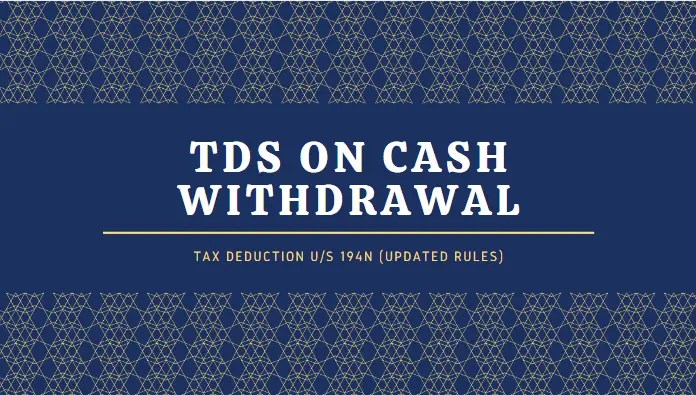TDS on Cash Withdrawal – Section 194N
Section 194N mandates TDS @ 2% for cash withdrawal exceeding ₹ 1 crore. This limit is reduced to ₹ 20 lakh if past 3 years returns are not filed. This articles explains briefly the provisions of section 194N.
Cash is often the source of Black Money. It lacks the audit trail provided by digital transactions. This is quite understood even by the tax authorities. That’s why they promote electronic transaction. They do it by incentivising with lower tax rates. But incentives alone cannot curtail cash usage. From rich to poor, all love cash. Specially when it is hassle free and offers full privacy from the eyes of taxman. What’s not hidden is the fact that India is largely non tax compliant nation. Many neither file tax returns nor use digital transactions. In consequence they remain outside the radars of taxman.
Cash comes and goes out of banking system and yet they generate little audit trails for the taxman. So, to add a cost to cash transaction at least for the wealthy guys, Union Budget 2019 introduced section 194N in Budget 2019. It provided TDS deduction @ 2% on cash withdrawals exceeding ₹ 1 Crore. Later in Budget 2020, the limit was reduced to ₹ 20 lakhs for those who have not filed their tax returns in past 3 years. Here, in this article we’ve discussed this section in brief manner along with its legal provision.
So, this section is applicable on Banks, co-operativesin banking activities and post offices. It is applicable on only cash withdrawals exceeding ₹ 1 Crore by any person from above entities. This limit of ₹ 1 Crore is reduced to ₹ 20 lakh for those who have not filed their tax returns of past 3 Years. Non-filing of returns for past 3 years is applied only if due dates under section 139(1) has also expired. i.e., if due dates has not expired, then the limit of withdrawal will not be reduced.
In short government, post offices, ATM operators, Business correspondents of banks, Co-operatives engaged in banking business or banks withdrawing cash from another bank, co-operative in banking business or post office are exempt. But any person or business other than those covered above in exemption will be liable for TDS. Banks from which such person or businesses withdraw cash, will deduct TDS if cash withdrawal exceeds the limits prescribed.
What is Section 194N and to whom it applies?
Section 194N provides to deduct TDS on cash payment exceeding ₹ 1 crore by –- All Banks,
- Co-operative Societies engaged in banking activities, and
- Post offices.
To whom section 194N is not applicable on withdrawing cash?
A proviso to section 194N is added by which, payment to below entities or persons will not attract TDS –- Government,
- Another Banks, Co-operatives in Banking Business or post office,
- Business correspondents of banks, co-operatives or post offices as authorised by RBI under Payment and Settlement Systems Act, 2007, and
- Authorised ATM operators by RBI under Payments and Settlement Act, 2007, acting for Banks and Co-operatives engaged in Banking Business.
Rate of TDS
But, if the person or business who is withdrawing cash has not filed tax returns of past 3 years for which time limit of filing returns under section 139(1) has expired, then the limit of ₹ 1 Crore is reduced to ₹ 20 lakh. In which cash rate of TDS is –- @ 2% for amount exceeding ₹ 20 lakh up to ₹ 1 Crore, and
- @ 5% for amount exceeding ₹ 1 Crore and above.
Some Important Clarifications
- Cash Withdrawal from different banks – The limit of ₹ 1 Crore or ₹ 20 lakh as applicable is for withdrawal from a single Bank or Co-operative in Banking Business or Post Office. The amount of cash withdrawals from different banks are not clubbed together for computing limit under this section.
- Cash Withdrawal from same Bank but different Accounts – Limit of ₹ 1 Crore or ₹ 20 lakh as applicable is for withdrawal from a single Bank. It covers all accounts maintained by same Bank. i.e., Cash withdrawals from all bank accounts under same bank will be used for calculating limit under this section. Likewise, different accounts of single co-operative banking business will also be clubbed for calculating limit for withdrawals from that single co-operative banking business. For Post office also, all accounts with Postal Department will be covered.
- Low limit of ₹ 20 lakh for non-tax return filers – Here, note the non-filing of tax returns for past 3 years is linked with expiry of due dates for those returns under section 139(1). i.e., even if return is not filed for past 3 years but time limit to file return under section 139(1) if not expired yet, then lower limit will not be applicable. Only, when the time limit to file return for past 3 years also expires than only limit of cash withdrawal is reduced to ₹ 20 lakhs for deducting TDS.
Some examples to help understand this section
- If you withdraw ₹ 2.4 crores from 3 different banks. You withdraw ₹ 80 lakhs from each banks. Will TDS will be deducted?
Share this post on: Facebook Twitter (X)
Previous: Value Added Statements – A way to Show Value added by organisation apart from Financials Next: The Enforcers of GST: Understanding Officers and Source of Their Powers Under the CGST ActCA Raj Kumar
I love blogging and studying taxation. I write articles related to Tax laws and common issues in handling taxation in India. Often, common but small mistakes make things complicated. I write and share them to save precious time of others.



Leave a Reply